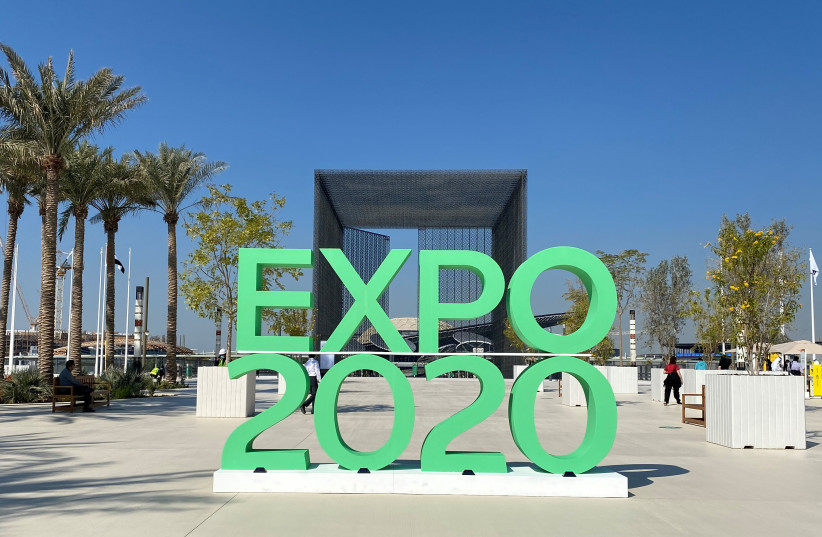Include Palestinians, EU in Israel-Jordan water-energy deal – opinion – Jerusalem Post
These ideas and initiatives can provide the economic platform, fortified with sufficient political ingredients, to reopen a high-level political dialogue between Jerusalem and Brussels.
By TIZIANA DELLA RAGIONE, ODED ERAN Published: DECEMBER 1, 2021
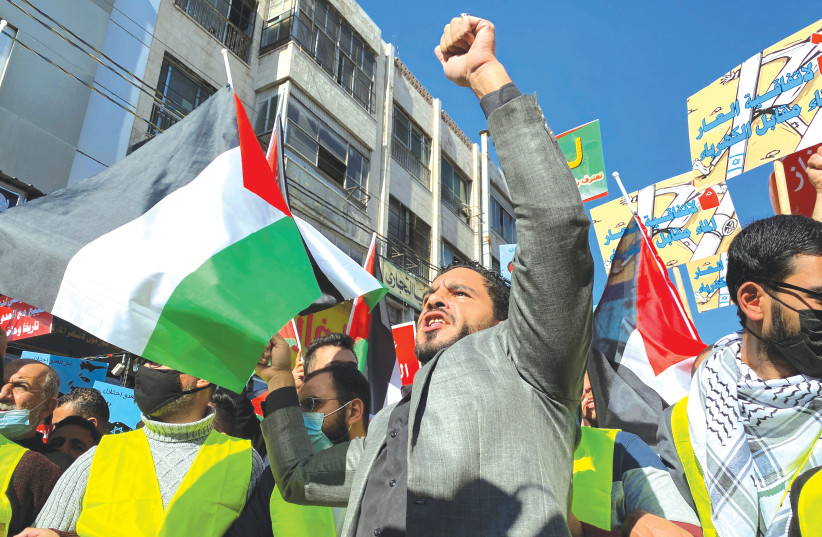
The new US-backed water-for-energy agreement between Israel and Jordan is a significant contribution to the political stability of the region, to Jordan’s acute water shortage, and to pushing forward the regional climate change.
The agreement is evidence of a renewed dialogue between the political leadership in Jordan and Israel, a result most likely made possible by the political changes that have occurred in the region since the normalization of ties with two Gulf states, Bahrain and the United Arab Emirates, and the emergence of the new Israeli government.
The deal is premised on the creation of a balanced dependence – Israel’s dependence on Jordan in importing solar energy and Jordan’s dependence on Israel in importing desalinated seawater. Purchasing solar power from Jordan, where the availability of renewable energy is greater and land and labor costs are lower, may indeed be the most cost-effective way for Israel to meet its Nationally Determined Contribution (NDC), at least as far as renewable energy is concerned. In fact, Israel has set its share of renewable energy generation at 30% by 2030, a goal that still seems very ambitious, considering that in 2020 alone it accounted for only 6.1%.
Israel has a limited area available for large-scale energy installation. The Negev, which looks like a vast desert area, is actually unavailable for this purpose, due to the fact that half of it is a military training ground while the other half is declared a natural reserve and covering the roofs of houses with solar panels does not seem to be enough to achieve this goal. For Jordan, the cost of desalinated water conveyed from the Mediterranean to the most populated region of Amman will be relatively less expensive than the alternative of desalinating water on the Jordanian coast of the Red Sea, because of the shorter distance.
The deal is also expected to have some political gains. The construction of a water desalination plant in Israel to supply water to Jordan will mitigate the kingdom’s water crisis, made even worse than elsewhere by climate change, population growth, intensified water use and increased competition for water across borders. At the same time, addressing water scarcity in Jordan is a strategic objective for Israel since Jordanian water shortages pose an increasing threat to national security and stability in its immediate vicinity.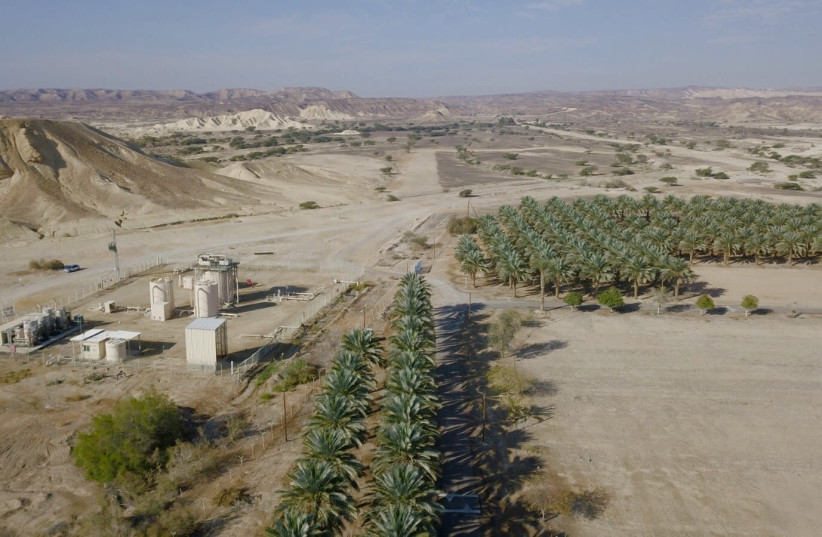
These are noble goals and meeting them will increase political and economic stability in this subregion of the Middle East.
Regrettable, however, is the absence of the minor partner, the Palestinians. The short distances between the possible routes of the solar power grid from Jordan to Israel and the water conveyor from the Mediterranean to Jordan and to the West Bank make the connection relatively simple and inexpensive. Doing so will remove the water file from what is otherwise a very complex Israeli-Palestinian conflict waiting to be resolved.
The Jordan-Israel-United Arab Emirates Masdar company agreement, signed this week, will likely take a decade to become operational. The addition of the Palestinian component would therefore still be possible and is unlikely to pose significant technical and administrative complexities to the regional project. Yet it could pave the way for greater EU involvement in revamping the Israeli-Palestinian peace process and for EU support for regional integration on climate and water issues in the Middle East, the latter in line with the ambitious goal of externalizing the EU’s Green Deal beyond its borders. Conducting a feasibility study to connect the Jordanian-Palestinian-Israeli solar electric grid to Europe would signal Europe’s interest in supporting a concrete project and certainly could positively influence the construction of the grid.
The new Israeli government has indicated that it wants to open a new page in its relations with the EU. While the ideas for a Palestinian economic renaissance raised by Israeli Foreign Minister Yair Lapid do not amount to a political horizon for the Palestinians, these ideas and initiatives like the new agreement signed this week can provide the economic platform, fortified with sufficient political ingredients, to reopen a high-level political dialogue between Jerusalem and Brussels.
Tiziana della Ragione is a visiting research associate at the Institute for National Security Studies (INSS) and a researcher at the Moshe Dayan Center (MDC) for Middle Eastern and African Studies at Tel Aviv University. Oded Eran was Israel’s ambassador to Jordan and the European Union and currently is a senior researcher at the INSS.
Declaration of intent for energy-water deal has ‘no impact on state budget’ — Media minister – Jordan Times
By JT – Nov 29,2021 – Last updated at Nov 29,2021 0 0 googleplus0 0 0
AMMAN — State Minister for Media Affairs Faisal Shboul on Sunday said that the declaration of intent, “energy for water”, will be under consideration for the next 10 months, stressing “it has no financial impact on Jordan, at least during the 2022 state budget”.
Shboul, who is also the government spokesperson, said that the declaration of intent has “nothing to do with the state budget”, adding that “the declaration of intent has not been included in the 2022 budget.
” The government will only consider the National Water Carrier Project. Shboul also reiterated “the declaration of intent needs to be discussed for the next 10 months”.
Last Monday, Jordan, the UAE and Israel signed a declaration of intent to negotiate the feasibility of a joint energy and water project.
The declaration of intent aims to conduct a feasibility study in 2022 for the joint project under which Jordan could get 200 million cubic metres of water a year.
A solar plant is to be built under the project and electricity will be provided to Israel.
Jordanians protest against water-for-energy deal with Israel – Al Jazeera
By Suleiman Al-Khalidi and Muath Freij
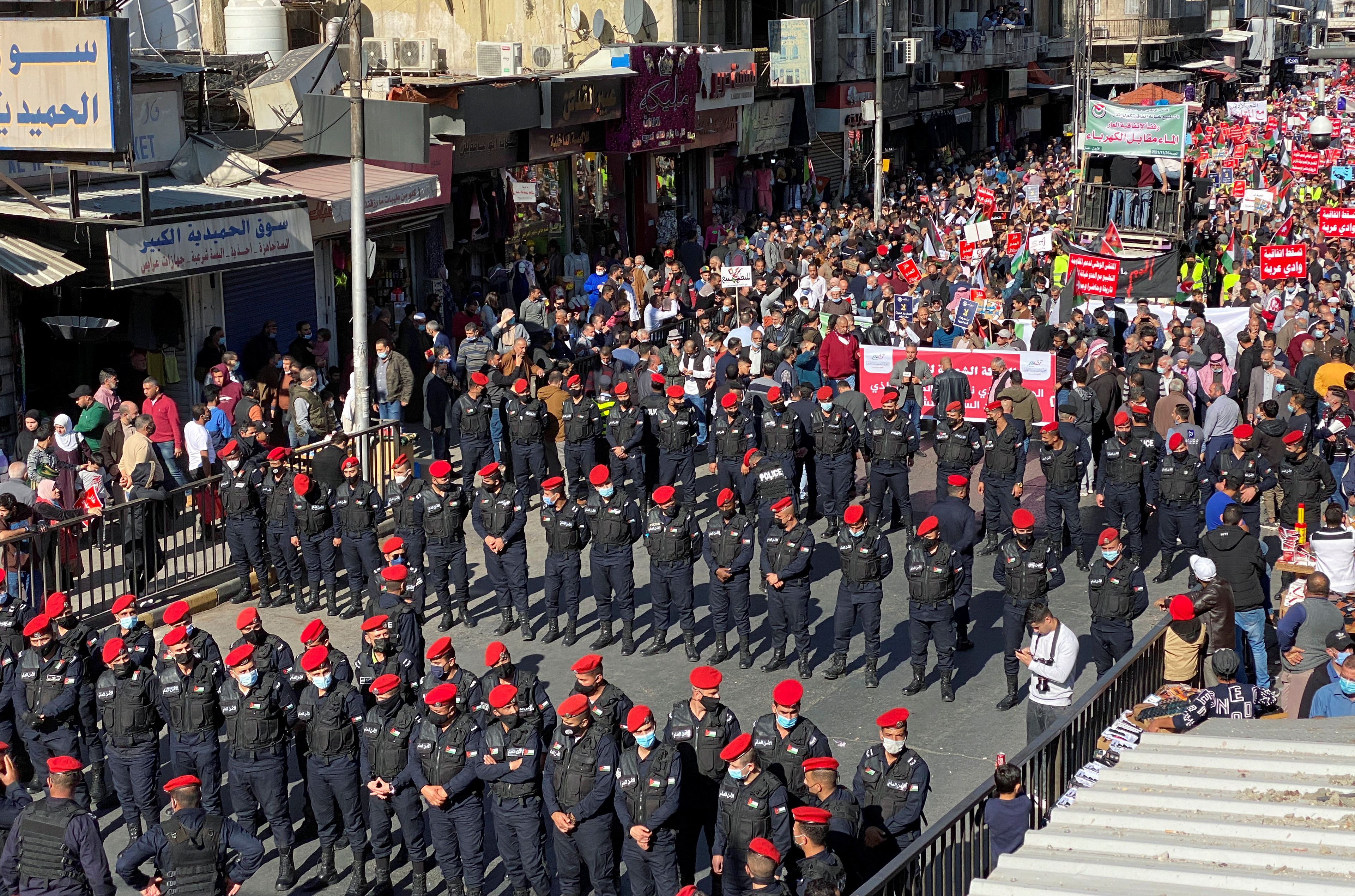
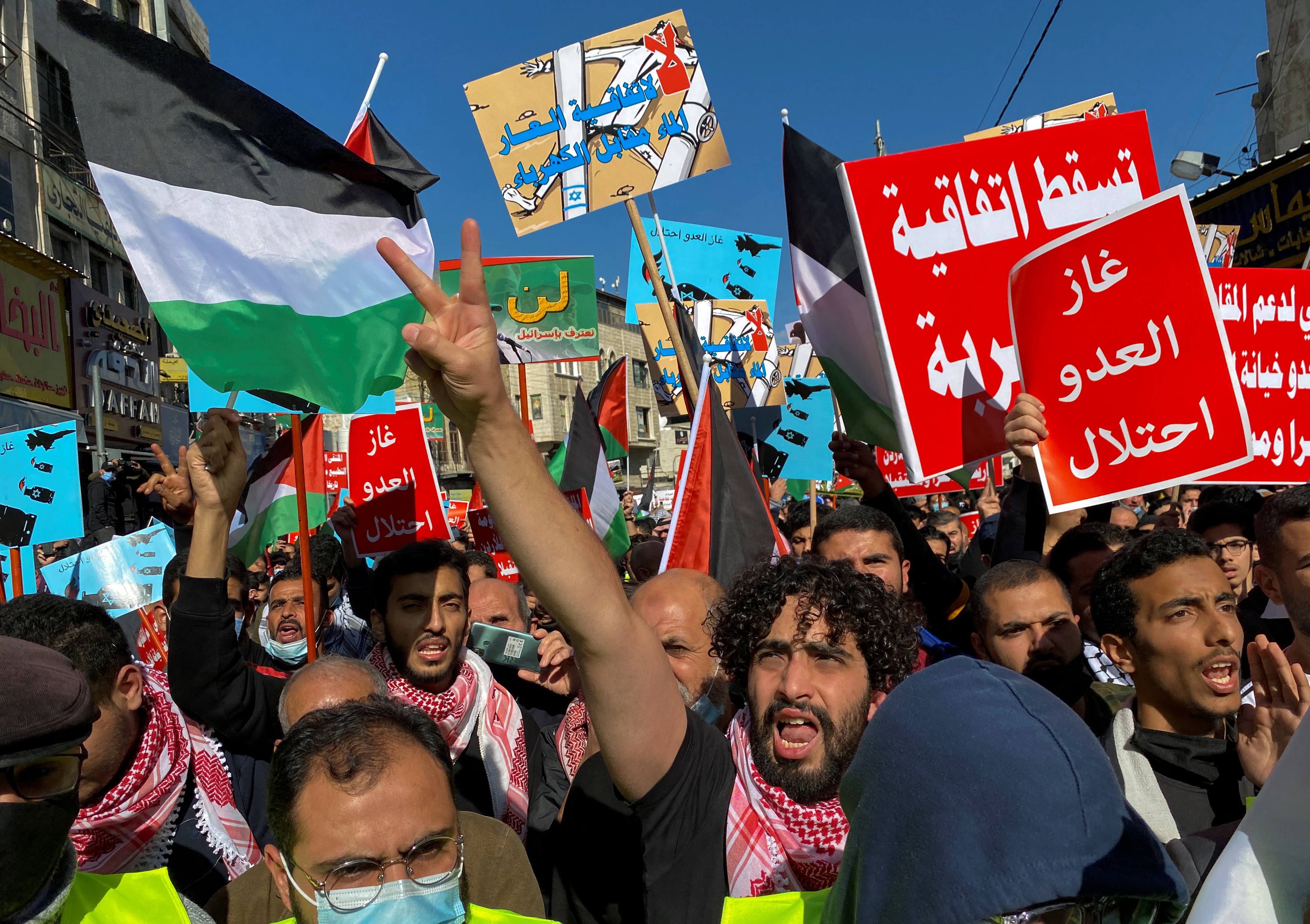
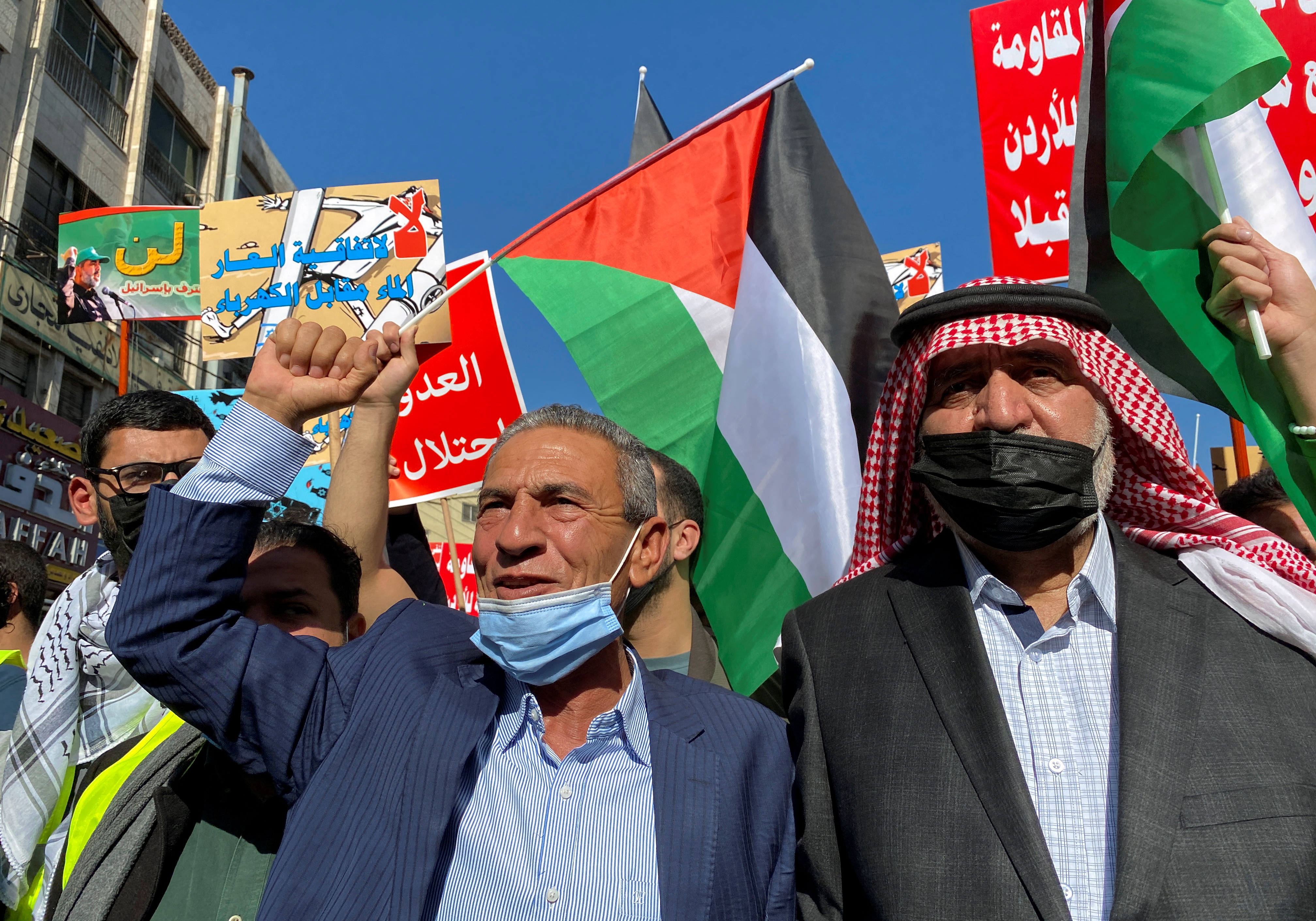
AMMAN, Nov 26 (Reuters) – Several thousand Jordanians protested on Friday against a water-for-energy deal with Israel and the United Emirates, calling on their government to scrap its peace agreement with Israel and saying any normalisation was a humiliating submission.
Police were deployed heavily around a downtown area of the capital Amman leading to the Husseini mosque where demonstrators marched after Friday prayers.
“No to the agreement of shame,” protesters chanted, some carrying banners such as “Normalisation is Treason” in a protest organized by a mix of opposition parties including Islamists and leftists as well as tribal groups and unions.
Jordan, Israel and the UAE signed the deal last Monday in the presence of U.S. climate envoy John Kerry.
Under the agreement, Jordan would install 600 megawatts of solar power generating capacity to be exported to Israel, while Israel would provide water-scarce Jordan with 200 million cubic metres of desalinated water.
The UAE, which became the first Gulf state to normalise relations with Israel last year, was expected build the solar plant in Jordan.
The initiative is subject to feasibility studies, but if it comes to fruition it will be one of the largest regional cooperation projects undertaken between Israel and Arab countries, Western diplomats say.
“This deal is aimed at linking Jordan with the Zionist entity completely. It is not a trade deal, it is a normalization deal that is shameful and humiliating,” said Ali Abu Sukkar, a prominent Islamist opposition figure.
Many Jordanians oppose the normalisation of ties with Israel that resulted from a landmark peace deal in 1994, which opened the way for far-reaching cooperation in energy, water and gas.
Anti-Israel sentiment runs high in a country where most of the 10 million citizens are of Palestinian origin. They or their parents were expelled or fled to Jordan in the fighting that accompanied the creation of Israel in 1948.
After the deal was announced this week sporadic demonstrations sprang up at university campuses across the country in defiance of a ban on protests. Hundreds of students chanted anti-Israel slogans and called on the government to sever ties with its neighbour and scrap the project.
Reporting by Suleiman Al-Khalidi Additional reporting by Jehad Abu Shalbak, Editing by William Maclean
Jordanians protest water-energy deal with Israel – Jordan Times
By JT – Nov 27,2021 – Last updated at Nov 27,2021 0 0 googleplus0 0 0 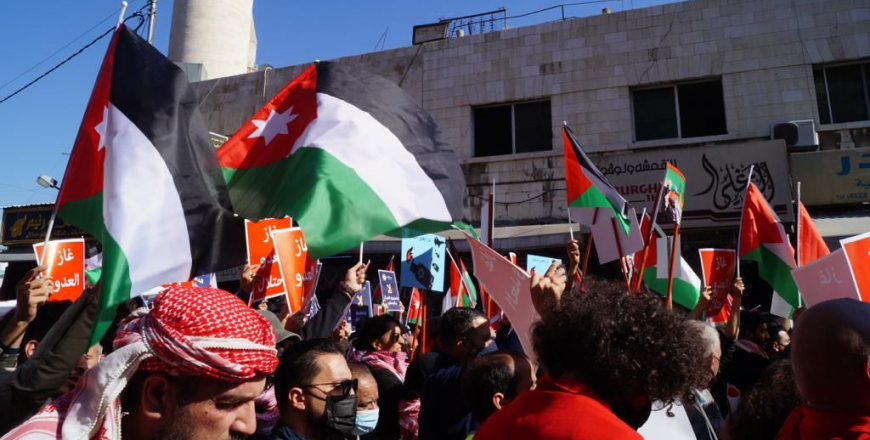
Jordanians march in downtown Amman in protest against the signing of a declaration document of intent by Jordan, the UAE and Israel on Friday (Photo by Hanna Davis)
AMMAN — Jordanians marched in downtown Amman on Friday in protest against the signing of a declaration document of intent by Jordan, the UAE and Israel.
During the demonstration near Al Husseini Mosque in downtown Amman after Friday prayer, the demonstrators called on the government to revoke the declaration.
The demonstrators, who held banners with slogans rejecting normalisation and going ahead with the deal, also called for severing the 1994 Wadi Araba peace treaty.
Stressing on their rejection to deal with the “Zionist entity”, the protestors called on the Jordanian government to focus on alternative local solutions and sources for water supply other than increasing reliance on Israel.
Last Monday, Jordan, the UAE and Israel signed a declaration of intent to negotiate the feasibility of a joint energy and water project.
The declaration of intent aims to conduct a feasibility study in 2022 for the joint project under which Jordan could get 200 million cubic metres of water a year.
A solar plant is to be built under the project and electricity will be provided to Israel.
Jordan receives 35 million cubic metres of water annually in accordance with the peace treaty, in addition to the 10 million cubic metres outside the treaty that was agreed upon in 2010.
For other sources, Jordan depends on the collection of rainwater and groundwater. The water share per capita in Jordan is 80 cubic metres, compared with a global average of 500 cubic metres per capita.
Omar Shoshan, chairman of the Jordanian Environmental Union, noted that there will be no direct benefit from the project for the environmental sector, especially in terms of climate change in Jordan, as it will not help mitigate or improve the impact of the noticeable climate change in the Kingdom.
Shoshan also highlighted the importance of the National Water Carrier Project, which he described as “sustainable and important”, as it works greatly with the adaptation to the scarcity of water resources and climate change in the Kingdom.
“It would have been best to rely on local sources to confront the problem of climate change and its impact on the water sector by cooperating with international partners to carry out the National Water Carrier Project without delay,” he added.
Following the announcement of the deal, several Jordanians voiced their rejection of the declaration.
Mohammad Alawad, a Twitter user, tweeted in Arabic saying that the National Water Carrier Project must be implemented, as it is “the largest water project in the Kingdom and would make great profits”.
He said the priority should be focusing on alternative local resources.
Twitter user Sondos tweeted in Arabic voicing her anger over the signed deal: “This agreement makes the future of Jordan’s water security dependent on the Israeli occupation and we as Jordanians completely reject all kinds of normalisation with Israel.”
https://www.jordantimes.com/news/local/jordanians-protest-water-energy-deal-israel
Jordan, UAE and Israel sign declaration of intent for energy-water project – Jordan Times
By JT – Nov 22,2021 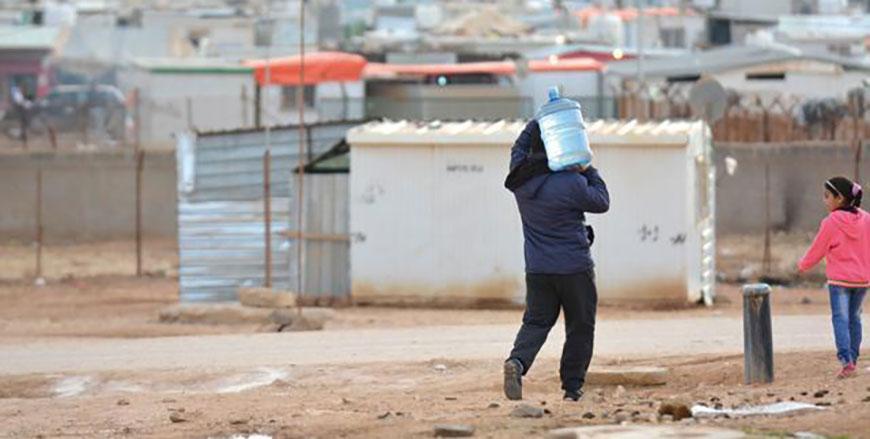
A Syrian refugee carries water at Zaatari camp, some 80km northeast of Amman, in this photo taken on January 28, 2018. Jordan is among the poorest countries in the world in terms of water resources (JT file photo)
AMMAN — Jordan, the UAE and Israel on Monday signed a declaration of intent to negotiate the feasibility of a joint energy and water project.
The declaration of intent was signed at the Expo 2020 Dubai, according to a Ministry of Water and Irrigation statement.
Omar Salameh, Water Ministry’s spokesperson, said that the declaration of intent aims to conduct a feasibility study for 2022, noting that Jordan could get 200 million cubic metres of water a year.
The declaration is “not a technical or legal agreement”, he said, noting that the project will not be implemented without providing Jordan with the aforementioned amount of water every year.
Salameh added that the project’s idea stems from Jordan’s growing demand for permanent water resources, which is increasing due to population growth and the industry, agriculture and other sectors’ reliance on water.
He noted the limited external support for Jordan, the impact of receiving refugees and the “abnormal” population growth rates within the past several years, which have all increased pressure on infrastructure and the provision of services.
Jordan is among the poorest countries in the world in terms of water resources, he said, predicting that the water deficit in the drinking water sector alone will reach 45 million cubic metres next year.
Salameh said that Jordan receives 35 million cubic metres of water annually in accordance with the peace treaty, in addition to the 10 million cubic metres outside the treaty that was agreed upon in 2010.
For other sources, Jordan depends on the collection of rainwater and groundwater, he said.
The water share per capita in Jordan is 80 cubic metres, compared with a global average of 500 cubic meters per capita, the official added.
The National Water Carrier Project is still a top priority, he said, noting that five coalitions have been qualified, while the project will be referred to the preferred coalition in 2022, adding that the amounts committed so far reached only $600 million, according to the statement.
The Declaration of Intent was signed by Minister of Water and Irrigation Mohammad Najjar, UAE Minister of Climate Change and Environment Maryam Bint Mohammed Al Muhairi and Israeli Minister of Energy Karen Al Harr, in the presence of US Special Presidential Envoy for Climate Affairs John Kerry, and Minister of Industry and Advanced Technology, UAE Special Envoy for Climate Change Sultan Bin Ahmed Al Jaber.
Israel, Jordan sign climate cooperation agreement in Dubai – Jerusalem Post
Jordan will build a designated solar field and export 600 megawatts to Israel, and work on solar energy storage solutions.
By LAHAV HARKOV Published: NOVEMBER 22, 2021
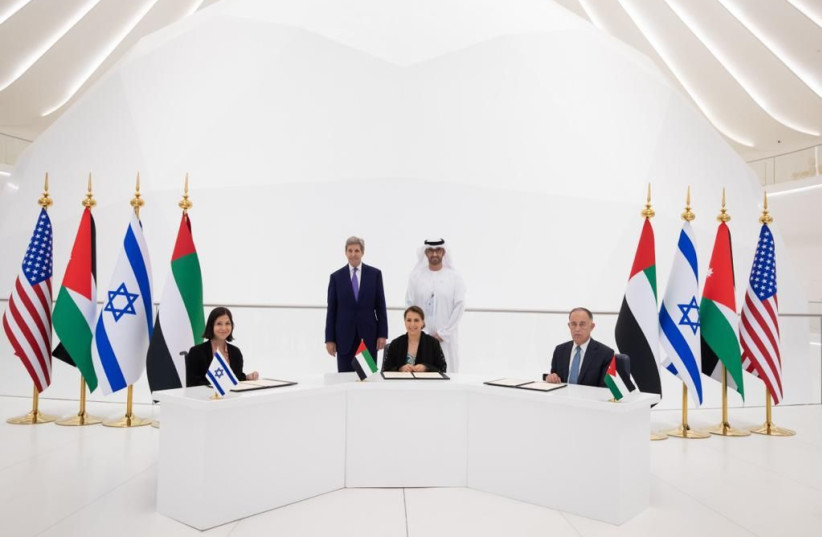
Israel and Jordan signed an agreement to work together to meet the challenges of climate change, mediated by the United Arab Emirates and the US, at a ceremony in Dubai on Monday.According to the agreement, Jordan will build a designated solar field and export 600 megawatts of electricity to Israel, and work on solar energy storage solutions.
At the same time, Israel will examine the possibility of exporting 200 million cubic meters of water to Jordan, which would come from a designated desalination plant. It would be sold at full price, contrary to the water Israel exports to Jordan under the terms of the peace treaty between the two countries.
Energy Minister Karin Elharrar, UAE Minister of Climate Change and Environment Mariam Al Mheiri, Jordanian Water Minister Mohammed al Najjar and US Special Envoy for Climate John Kerry gathered at the World Expo in Dubai on Monday, for the first three to sign the declaration of intentions to build the solar field and desalination plant.The details of the plans are expected to be finalized during 2022.
The sign of Dubai Expo 2020 is seen at the entrance of the site in Dubai, United Arab Emirates January 16, 2021. (credit: REUTERS/RULA ROUHANA )
UAE Foreign Minister Abdullah bin Zayed pointed out that Jordan has been suffering from a lack of water as a result of climate change, which is expected to have a great impact on the Middle East.“
The declaration signed emphasizes how countries can work together to accelerate changes to [green] energy and build a more sustainable future for everyone,” he said.
The agreement between Israel and Jordan “will strengthen climate security and shared interests of the two countries.” Bin Zayed said the declaration is another result of the Abraham Accords, which “strengthen peace, stability and prosperity for states in the region and the lives and futures of their residents.”
Elharrar said the entire Middle East will benefit from the agreement, which shows how countries can work together to fight climate change.“Israel and Jordan are two countries with different needs and abilities helping one another deal with challenges in a green, clean and efficient way,” she said. “Jordan has plenty of open space and sunlight, which will help Israel move over to green energy and meet the ambitious goals we set, and Israel, with excellent desalination technology, will help Jordan with its water crisis.”
Al Najjar said Jordan’s water crisis comes from climate change as well as an increase of refugees in the country.“Desalination is an important component in stabilizing Jordan’s water market, and we are constantly looking at ways to increase supply,” he stated.
Kerry called for countries in the Middle East to work together against climate change, and he called the agreement an excellent example of this.
The US “is impressed by the courage and the creative steps being taken by the sides to make this declaration possible, and expects to work with the sides… to turn the shared challenge of climate change into an opportunity to build a more prosperous future,” he said.

